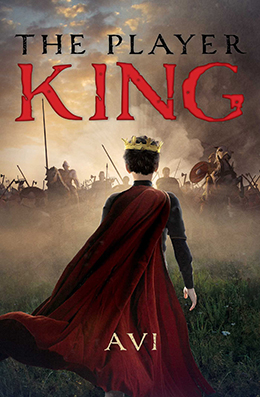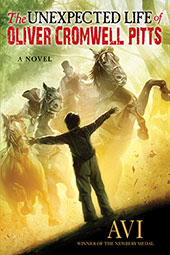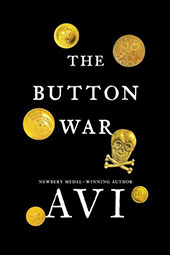The Player King

Richard Jackson/Atheneum, 2017
buy the book
audio book narrated by
John Keating
if you liked this book, try:
What’s this book about?
Read an amazingly true tale of a boy plucked from the gutter to become the King of England.
England, 1486. King Henry VII has recently snatched the English Crown and now sits on the throne, while young Prince Edward, who has a truer claim, has apparently disappeared. Meanwhile, a penniless kitchen boy named Lambert Simnel is slaving away at a tavern in Oxford—until a mysterious friar, Brother Simonds, buys Lambert from the tavern keeper and whisks him away in the dead of night. But this is nothing compared to the secret that the friar reveals: You, Lambert, are actually Prince Edward, the true King of England!
With the aid of the deceitful Earl of Lincoln, Brother Simonds sets out to teach the boy how to become the rightful English king. Lambert has everything to gain and nothing to lose, or so he thinks. Yet in this dangerous battle for the throne, Lambert is not prepared for what’s to come—or for what it really means to play at being a king.
Story Behind the Story
Part 1: When one reads history, one learns about big events and important people, such as the American Revolution, or, say, Napoleon. But if you read the footnotes in those histories you can learn about the individuals who lived in those historical moments. You learn about British prison ships in New York City, where more people died by maltreatment than on the revolutionary battlefields.
Part 2: If you read history—as I do for the stories—it is more often than not populated by big people, kings, queens, generals, senators and presidents. Such people do alter history, sometimes for the better, or worse. But embedded in such tales are countless—if only passing—references to others, small folk.
Reviews
“Based on historical fact, the novel strongly depicts Lambert’s emotions: his initial confusion, his growing excitement over the prospect of gaining wealth and power (although he knows he has no true claim to the throne), and his fear when he realizes that he is being used as a pawn in a deadly game. Avi’s short, accessible chapters and candid first-person narration create suspense and strongly evoke the political climate of the era, revealing an odd, mysterious chapter in England’s history.” (Publishers Weekly)
“Narrator John Keating’s breezy tone and British accent bring authenticity to this Tudor story by Avi, king of children’s historical fiction. Young Lambert is plucked from his life as a kitchen boy in a tavern cellar, where he lives ‘like a rotten turnip,’ and with break taking speed finds himself seated on the English throne. Keating keeps Lambert’s perspective convincingly light and astonished without making him sound too young. In stark contrast, Keating’s voice booms with hostility when he’s speaking as any of the handful of adults who control Lambert’s world. Keating captures Lambert’s humor and good nature and adds vivacity to Avi’s otherwise straightforward prose. Even when the action descends into bloody battle, Keating provides just the right level of intensity for a story intended for younger ears.” (a review of the audio book, S.T.C. © AudioFile 2018)
“Told from Lambert’s point of view, the first-person narrative effectively avoids the complicated political backstory and focuses on the boy’s experiences as he learns the unfamiliar speech, manners, and knowledge and plays his part. Avi, whose Newbery Award-winning Crispin was set in fourteenthcentury England, again makes the past vivid and personal in this relatively short, accessible book. An author’s note reveals what is known of the actual Lambert Simnel, whose story inspired the novel.” (Booklist)
“An interesting slice of history told by an engaging and believable protagonist. Hand to fans of the author, young Tudor enthusiasts, and readers who enjoy medieval-set fiction.” (School Library Journal)

